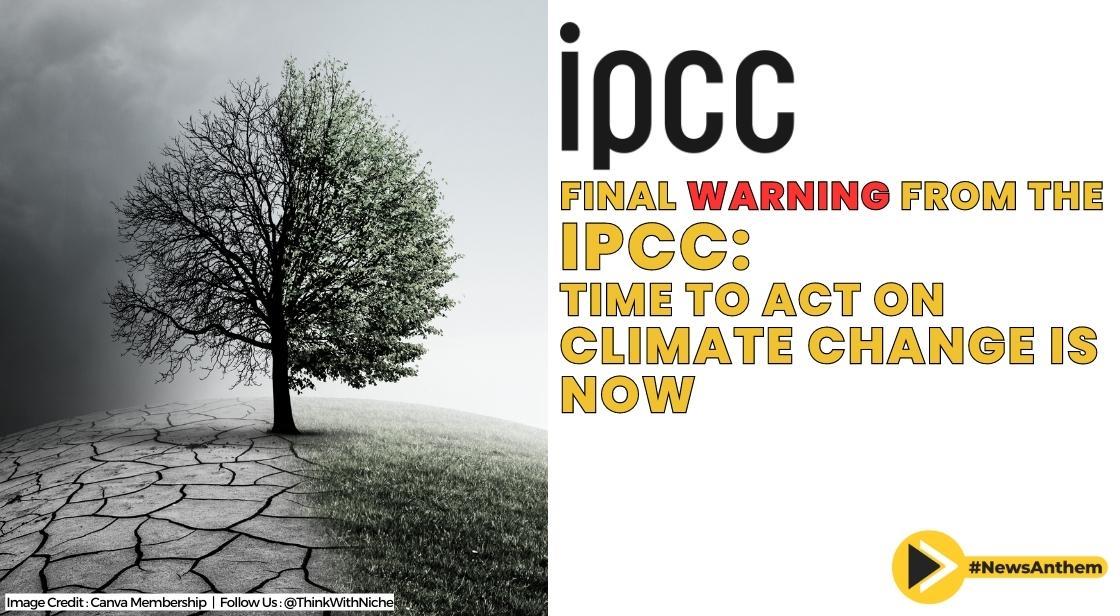Final Warning From IPCC: Time To Act On Climate Change Is Now

News Synopsis
According to the fourth and final installment of the Intergovernmental Panel on Climate Change (IPCC) sixth assessment (AR6) synthesis report, approved by 195 nations on Monday, it is possible to avoid catastrophic heat waves, floods, drought, crop failures, and species extinction.
The report concludes that the world now possesses the know-how and technology to address the climate crisis and that there is a "rapidly closing window of opportunity to secure a liveable and sustainable future for all." The report, which has been nine years in the making, points out that multiple lines of evidence suggest that recent mitigation policies of a few countries, which have increased energy efficiency, reduced deforestation rates, and accelerated technology deployment, have resulted in "avoided, and in some cases reduced or removed emissions." While all these measures are insufficient to stabilize temperatures, they do suggest that there is yet hope for mankind if all nations undertake an urgent and radical move away from fossil fuels, limit methane emissions, and halt deforestation. Dire Warning The Planet has already warmed by an average of 1.1 degrees Celsius during the industrial age, and temperatures will climb to 1.5 degrees Celsius by "the first half of 2030," according to the analysis. The current and projected fossil fuel infrastructure - coal-fired power plants, oil wells, industries, cars and trucks throughout the world - will already create enough carbon dioxide to warm the earth by about 2 degrees Celsius this century.
To keep warming below that level, many of those projects would have to be canceled, retired early, or somehow cleaned up. Even as the report reveals the sheer magnitude of the ambition required to avoid the worst consequences of climate change, it details how risks increase with each increment of warming and how impacts are more severe and longer lasting than previously estimated, even with the relatively modest warming we have seen so far. Every region is having "widespread adverse impacts", over half of the world's population is "highly vulnerable" to the effects of climate change, and the consequences are expected to worsen fast. IPCC is a United Nations body that evaluates climate science by bringing together leading scientists to study climate change and how it is reshaping the world and offers solutions to cut emissions and adapt to a hotter planet. It was founded in 1988 by the World Meteorological Organization and the United Nations Environment Program.
Climate Change Predictions The IPCC's warnings began in 1990 with its First Assessment Report, which predicted the rate of global warming. The Second Assessment, issued in 1995, stated with more certainty that human activities were substantially responsible for climate change. The Third Assessment warned in 2001 that if we did not cut our carbon emissions, the temperature rises would be worse than previously predicted. By the time of its Fourth Assessment Report in 2007, the IPCC was using phrases like unequivocal to express the consensus that humans were the primary cause of global warming.
The Fifth Assessment delivered a harsh reality to the world in 2014: greenhouse gas emissions were greater than ever, triggering an unprecedented acceleration of climate change's effects. The Sixth Assessment, which was released in three parts beginning in 2021, included Physical Science, Mitigation, and Adaptation. It comprised three special reports: 1.5°C global warming, the ocean and cryosphere, and climate change and land. The synthesis report summarises the most recent update on the state of knowledge in climate science and marks the end of the IPCC AR6 cycle.
According to the IPCC's Sixth Assessment, a quick phaseout of fossil fuels and rollout of renewable energies, together with energy efficiency and demand-side policies, remains the clearest and most assured option to prevent overshoot. Suggestions for Routes Climate scientists at the IPCC emphasise that they do not advise governments what to do, but rather examine the various paths countries may pursue. In UN jargon, they are "policy-relevant but not policy-prescriptive." They also state that their future results are forecasts, based on various warming scenarios, rather than predictions.
However, it is important to note that the synthesis report will almost certainly be the last such assessment until 2030 and will inform the 2023 Global Stocktake, i.e., progress on the Paris agreement commitments, at the COP 28, the next UN climate negotiations to be held in the United Arab Emirates later this year. During COP28, governments must come prepared, as the IPCC states, to peak emissions by 2025 at the latest, almost halve emissions by 2030, and achieve net-zero CO2 emissions by mid-century, all while guaranteeing a just and equitable transition. According to UN Secretary General António Guterres, "our planet need climate action on all fronts: everything, everywhere, all at once." It is the only way the world can meet the IPCC's agenda. Shailendra Yashwant is a senior advisor with Climate Action Network South Asia (CANSA). @shaibaba is his Twitter handle. Opinions are personal and do not represent the stance of this publication.
Important News and Blog Tags for Readers
Intergovernmental Panel on Climate Change (IPCC)
Secure a liveable and sustainable future for all
avoid the worst consequences of climate change
World Meteorological Organization
United Nations Environment Program
Progress on the Paris agreement commitments







